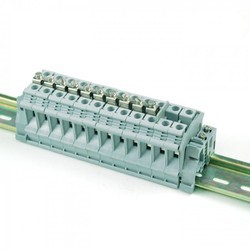- All
- Product Name
- Product Keyword
- Product Model
- Product Summary
- Product Description
- Multi Field Search
Views: 64 Author: Site Editor Publish Time: 2023-11-24 Origin: Site
Wire connectors are widely used in various industries and applications due to their numerous benefits. In the automotive industry, wire connectors are used extensively to connect the wiring harnesses of vehicles. In the aerospace industry, wire connectors are used to connect the wiring systems of airplanes and spacecraft. In the industrial sector, wire connectors are used to connect motors, sensors, and other electrical components.
Wire connectors are also commonly used in residential and commercial buildings. They are used to connect electrical outlets, switches, and light fixtures, as well as to connect wiring for heating, ventilation, and air conditioning systems. Wire connectors can also be used to connect low voltage wiring for doorbells, intercom systems, and security cameras.
Wire connectors are essential components used in electrical systems to connect wires and cables. Here are some benefits of using wire connectors for electrical connections:
Secure connection: Wire connectors provide a secure connection between wires, ensuring that they remain connected even under challenging conditions such as vibration, temperature changes, and movement. This ensures that the electrical system remains reliable and safe.
Easy to use: Wire connectors are easy to use and require no special skills or tools to install. They come in various sizes and types, making it easy to choose the right connector for your specific application.
Time-saving: Using wire connectors can save time compared to other methods of connecting wires, such as soldering. This is because wire connectors require no heating, cooling, or waiting time, allowing you to complete the connection quickly and efficiently.

Versatile: Wire connectors are versatile and can be used in a wide range of applications, including residential, commercial, and industrial settings. They can also be used with different types of wires and cables, including stranded and solid wires.
Modular: Wire connectors are modular, which means that they can be easily added or removed as needed. This makes them ideal for applications that require frequent modifications or upgrades.
Cost-effective: Wire connectors are cost-effective compared to other methods of connecting wires, such as soldering or welding. This is because wire connectors require no special tools or equipment, reducing the overall cost of installation.
Safety: Wire connectors provide a safe and reliable connection between wires, reducing the risk of electrical shock or fire. They are also designed to meet industry safety standards, ensuring that they are suitable for use in various applications.
Aesthetically pleasing: Wire connectors are available in various colors and styles, making them aesthetically pleasing and suitable for use in visible areas. This can help to enhance the overall appearance of your electrical system.
In conclusion, wire connectors are an essential component of electrical systems that offer several benefits, including a secure connection, ease of use, versatility, modularity, cost-effectiveness, safety, and aesthetic appeal. When choosing wire connectors, it is important to consider the specific requirements of your application, including wire size, type, and environmental conditions. Always follow the manufacturer's instructions and safety guidelines when working with wire connectors to ensure the safety and reliability of your electrical system.
A terminal block is a compact, insulated base with metal contacts that lets you clamp, join, and distribute conductors without soldering. If you’ve ever routed power to a drive, brought sensor leads into a controller, or handed off field wiring to a PCB, you’ve used one. Understanding what is a term
As a Engineer ,It is very important to choose globally recognized premium terminal blocks .these manufacturersas below: Phoenix Contact, WAGO, Weidmüller, Eaton, Molex, Amphenol, Harting, and Shanye Electronics (subsidiary of Kefa Electronics). These industry leaders collectively dominate the $4.6
This article covers the technical features of spring-loaded and push-in terminals, and both the advantages and disadvantages of these technologies when it comes to installation practices, commissioning, footprint and authorisation for the North American market. Why do we need spring terminal block ?
Wiring a terminal block correctly is a fundamental skill in electrical work, ensuring safe and reliable connections. This article will help you to understand the essential steps, from preparing your wires to securing them properly within various terminal block types.ContentWhat are Terminal Blocks?R
What is terminal block ?terminal block, also known as a connection terminal, is a modular block used in electrical and electronics systems to connect and secure electrical wires or cables. It serves as a convenient and organized way to make electrical connections, whether for power distribution, sig
Terminal electronics is the key point at which a conductor from a electronic component, device or network comes to an end.Terminal may also refer to an electrical connector at this endpoint, acting as the reusable interface to a conductor and creating a point where external circuits can be connected